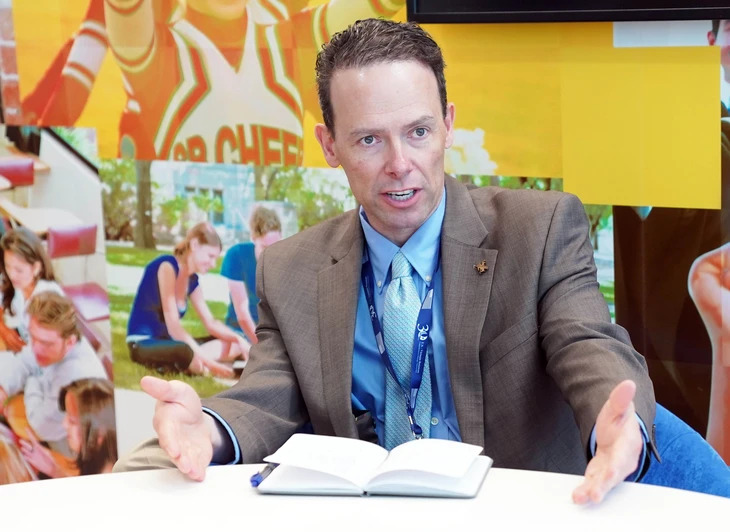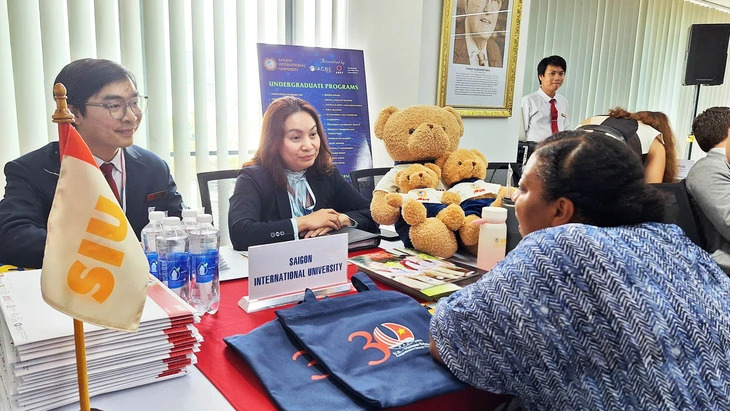Numerous American universities are turning to Vietnam to expand their undergraduate and graduate enrollment, addressing domestic challenges of diminishing student numbers due to an aging population.
A higher education delegation of over 40 senior leaders from 21 renowned American universities across 17 states participated in a five-day study tour of Vietnam from March 31 to April 4 under the International Academic Partnership Program (IAPP), according to the U.S. Embassy in Vietnam.
The IAPP is hosted by the U.S. Mission in Vietnam, in collaboration with Vietnam's Ministry of Education and Training and the U.S.-based Institute of International Education, in celebration of 30 years of Vietnam-U.S. relations.
During the tour, the delegation focused on exploring opportunities to attract potential students to American institutions while forging new partnerships and strengthening academic collaboration with their Vietnamese counterparts.
They also gained insights into Vietnam's higher education system through campus visits, networking events, and meetings with stakeholders in the government and private education sectors, the embassy said.
On April 4, representatives from the University of Vermont visited Saigon International University to assess recruitment opportunities.
During the visit, Dr. Jamie McGowan, executive director of International Partnerships and Programs at the University of Vermont, shared that Vermont is currently facing challenges associated with an aging population, leading to a need to expand graduate education and attract international students.
“We aim to double our graduate student enrollment in the next five years. Vietnamese students, with their strong academic background and ambition, will play a crucial role in this strategy,” McGowan stated.
She emphasized that the University of Vermont seeks not only to recruit students but also to establish sustainable partnerships, including transfer programs where students can study one to two years in Vietnam before completing their degrees in the U.S.
Additionally, the university recently received a US$24 million federal grant to develop a semiconductor technology center, starting with an intensive certification program.
 |
| Daniel Dale, a professor of physics and astronomy and associate dean of the College of Engineering and Physical Sciences at the University of Wyoming in the United States, speaks to reporters about the potential enrollment of Vietnamese students. Photo: N.D. / Tuoi Tre |
“Therefore, we are exploring the potential for trilateral collaborations among governments, businesses, and universities – a model that could be expanded to the Asian region, particularly Vietnam,” she added.
Daniel Dale, a professor of physics and astronomy and associate dean of the University of Wyoming College of Engineering and Physical Sciences, also noted that many U.S. universities are experiencing significant declines in student numbers due to an aging population and low birth rates. Some faculties, such as physics, struggle to attract domestic students.
Therefore, the university plans to attract more international students to fundamental science programs. Vietnamese students could be the solution to this challenge, Dale said.
Dale proposed creating a summer exchange program to bring Vietnamese students to the University of Wyoming for study and research, fostering collaborations among faculty and researchers, and potentially developing joint degree or training programs.
According to Natella Svistunova, Cultural Attaché of the U.S. Consulate General in Ho Chi Minh City, the initial connections established between U.S. and Vietnamese universities through the IAPP will lay the foundation for sustainable academic collaborations.
In the context of rapid global shifts in technology and education, proactive engagement between universities from both countries is a positive signal not only for education but also for long-term cultural ties.
More than 30,000 students from Vietnam were enrolled at American educational institutions in the 2023-24 academic year, collectively contributing more than $1 billion to the U.S. economy, according to the embassy.
U.S. Ambassador to Vietnam Marc Knapper emphasized that expanding educational cooperation is crucial to the success of the U.S.-Vietnam comprehensive strategic partnership.
“By bringing together top universities from both nations, we are creating new pathways for students and researchers to thrive in both countries,” he stated.
Like us on Facebook or follow us on Twitter to get the latest news about Vietnam!

















































